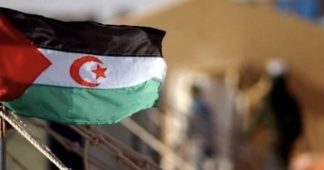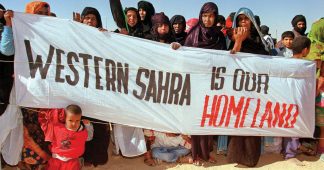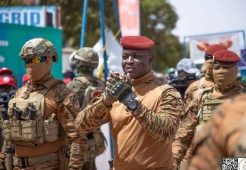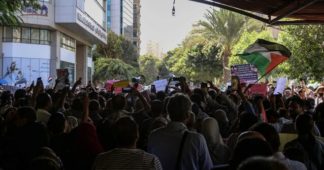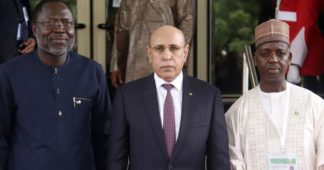By Abayomi Azikiwe* Global Research
Oct 15, 2025
High unemployment, inflation, lack of basic services and bad governance are driving young people into the streets
In the last remaining monarchy in North Africa, the Kingdom of Morocco, has been hit with mass demonstrations by young people demanding better living conditions including reduced costs for health care and education.
Madagascar, a Southern African state off the eastern coast of the continent, has also undergone several weeks of mass demonstrations and social unrest which has resulted in what appears to be an attempted military coup.
These mass actions illustrate a pattern of unrest among youth across Africa where people under the age of 30 represent the overwhelming majority of those living on the continent. A restless and relentless youth population along with workers, farmers and disgruntled security forces has created political turmoil which the governments of Morocco and Madagascar are struggling to cope with.
With respect to the Kingdom of Morocco there are the questions of genuine democracy as well as self determination for the people in the Western Sahara where Rabat has blocked the holding of an United Nations mandated referendum on the future of the Sahrawi Arab Democratic Republic. The African Union (AU) has recognized the rights of the Sahrawi people to self determination while the Moroccan monarchy backed by the imperialist states are continuing to occupy the territory. ( Sahara Press Service (SPS))
Despite its alliance with France and the United States, the ruling interests in Morocco have still not been able to provide an adequate standard of living to millions of people inside the country suffering from rising costs for water and healthcare services. The reliance on tourism has prompted the government to engage in the construction of “prestige projects” which can prove profitable to real estate firms while redirecting investment from the well being of the workers, farmers and youth.
Morocco is said to be the most visited country in Africa where tourists travel to view the centuries-old palaces, sweeping mountains, desert landscapes and crowded markets. The country boasts the presence of a high-speed rail line and the building of several stadiums to host the 2030 Soccer World Cup matches.
Yet, it is these budget priorities for the Moroccan government which has drawn the ire of young people and the working poor. Organizing under the label “Gen Z 212”, the youth-led protest movement which sprang up in late September is said to be “leaderless.” Western media outlets have drawn comparisons with recent demonstrations in Nepal, however, the events in Morocco and Madagascar have a distinct history peculiar to Africa where outbreaks have occurred over the last year in other states such as Kenya and Nigeria demanding an easing in taxation and drastic reforms related to governance.
While these “development” projects are being promoted in Morocco, the cost of healthcare, housing and education are rising rapidly. Joblessness for young people is estimated to be as high as 36% among a population of 37 million people.
After two weeks of mass demonstrations and efforts by the security forces to suppress the unrest, King Mohammed VI addressed the people of Morocco on October 10. During his speech, which was in direct response to the demands made to the monarchy, King Mohammed VI criticized political officials for neglecting the needs of the masses. Whether or not this overture will be adequate to quell the demonstrations remains to be seen.
In a report published by the Associated Press on the current situation in Morocco, it said that:
“Across Morocco, joblessness for those ages 15 to 24 is stubbornly high. Classrooms are packed. And hospitals are stretched thin, including one in Agadir where a woman passed away this week, months after eight others died giving birth. The conditions at the public hospitals where they died were among the sparks to ignite protests in September. Gen Z 212 has gradually sharpened their demands and on Thursday published their most specific to date, urging officials to move fast to hire more health workers and boost spending, citing the government’s own reports warning of severe staffing and funding shortages.”
Although King Mohammed VI spoke to the demands of the youth-led demonstrations, the level of repression utilized by the security forces is indicative of the resistance to basic political and economic reforms. The inability of the Moroccan state to meet the fundamental needs of the people will only fuel further demonstrations and outmigration by the youth seeking opportunities in Europe and other geo-political regions.
The same article quoted above went on to point out some of the key points articulated in the letter sent to the monarchy:
“Their letter pressed for an end to the growing privatization of Morocco’s education system and for the release of who they called ‘opinion detainees,’ arrested for taking part in the Gen Z protests. Local news outlets reported that more than 400 people have been arrested for vandalism linked to the protests. Some of them were held in custody. Activists have for decades criticized Morocco’s goal to have 20% of students educated in private schools for deepening inequality as wealthier families often send their children to private institutions, while public ones remain overcrowded and underfunded.”
Madagascar Military Joins Mass Demonstrations
On October 12, President Andry Rajoelina of Madagascar stated that there was an attempted military coup underway in the island-nation located off the coast of East Africa in the Indian Ocean. The country has been hit with mass demonstrations for several weeks where 22 people have been killed. These claims of 22 deaths have been disputed by the Rajoelina administration which says the number of those killed is far lower.
An elite unit within the Madagascar military known as CAPSAT announced on October 12 that it had taken over the Armed Forces of Malagasy. There were reports of the appointments of new military leaders and the defection of several high-ranking officials.
Additional reports indicate that President Rajoelina was flown out of the country by the French government. The CAPSAT unit of the military was associated with the 2009 mutiny in Madagascar which brought Rajoelina to power.
The president served as a transitional leader after 2009 and later was elected in 2018. In recent weeks demonstrations erupted over shortages of electricity and water.
Like other capitalist-dominated states and geo-political regions throughout the world, inflation is running rampant due to the imposition of tariffs by the administration of President Donald Trump in Washington and the increased demands for higher defense spending for those aligned with the U.S. and NATO. In developing states in Africa, the dependency upon the world capitalist system for exports of locally produced commodities and the importation of foreign products places tremendous pressure on workers, farmers and young people.
Rajoelina had announced he would speak to the nation on the afternoon of October 13. Nonetheless, the address was postponed amid rumors of his departure from Madagascar and the ascendancy of a military regime which temporarily appears to have gained popular support.
An Associated Press report on the unrest in Madagascar seemed to confirm that President Rajoelina had been removed from office with the CAPSAT military unit appearing to constitute the actual authority in the capital of Antananarivo and in other parts of the country. On October 13, the AP noted:
“A commander of CAPSAT, Col. Michael Randrianirina, said that his soldiers had exchanged gunfire with security forces who were attempting to quell weekend protests, and one of his soldiers was killed. But there was no major fighting on the streets, and soldiers riding on armored vehicles and waving Madagascar flags were cheered by people in Antananarivo.
Randrianirina said that the army had ‘responded to the people’s calls,’ but denied there was a coup. Speaking at the country’s military headquarters on Sunday, he told reporters that it was up to the Madagascan people to decide what happens next, and if Rajoelina leaves power and a new election is held.”)
AU Member-States Must Address the Burgeoning Economic and Political Crises
The 1.4 billion people living in Africa are demanding that the leadership effectively correct the economic downturns and the political divisions which are gripping several states and regions throughout the continent. The majority youth, working class and agriculturally producing sectors of the population should be placed at the center of development plans to rebuild the societies.
Madagascar since the times of French colonialism has been mainly an agricultural-based economy which produces crops for exports to western states. In recent years, oil exploration has been taking place.
However, these industries have not brought prosperity to the people. Any future government in Madagascar will require the implementation of socialist planning to guarantee the equitable distribution of profits from the exports of natural resources.
This same strategy will hold true for the Kingdom of Morocco since in order to unleash the creative energy and labor power of the workers, farmers and youth, the government will be required to democratize the society in the interests of the majority of its people. Events in recent months indicate clearly that the AU member-states cannot continue to depend upon imperialism in their development plans.
*Abayomi Azikiweis the editor of the Pan-African News Wire. He is a Research Associate of the Centre for Research on Globalization (CRG).
